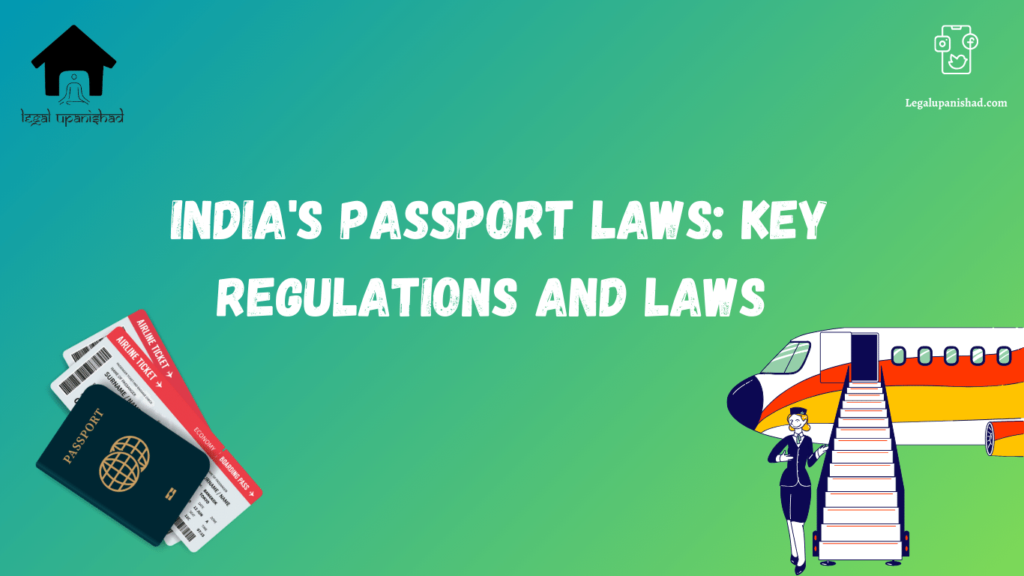

India’s passport regulations govern the issuance, renewal, and use of passports. The process, which is overseen by the Ministry of External Affairs, involves submitting applications online or through Passport Seva Kendras. Regular, diplomatic, and official passports with varied validity periods are issued. Address verification and police clearance are possible requirements.
Certain tourists with ECNR status may be excluded from emigration checks. For those who require a passport quickly, the Tatkal scheme is available. It is critical to stay up to date on changes in regulations and requirements by visiting the official Passport Seva website or visiting the nearest Passport Seva Kendra for accurate and up-to-date information.
Validity: The validity of an Indian passport depends on the applicant’s age at the time of issuance. For individuals above 18 years, the passport is usually valid for 10 years. For minors (below 18), it is valid for 5 years.
The Passports Act, 1967 is a crucial legislation in India that regulates the issuance, renewal, and usage of passports. It defines different classes of passports, designates Passport Authorities, and empowers them to issue and impound passports. The Act outlines the application process, grounds for refusal, and appeal procedures. It emphasizes that passports are the property of the government.
The Act also lists offenses related to passports and prescribes penalties for violations. Under this Act, the Central Government is granted the authority to make rules and delegate powers. It plays a vital role in ensuring proper documentation for international travel and maintaining national security.
The Passports Act, 1967 is a comprehensive legislation governing passports in India. Below are some key provisions of the Act along with the corresponding sections:
The Passport Rules, 1980, supplement the Passports Act, 1967, and provide detailed guidelines for the implementation of passport provisions in India. These rules cover various aspects of passport issuance and usage. They specify the procedures for passport application, address verification, police clearance, and the Tatkal scheme for expedited issuance.
The rules define the conditions for granting Emigration Check Not Required (ECNR) status and outline the grounds for impounding or revoking passports. They also detail the process for reporting and obtaining a replacement for lost or damaged passports. Adhering to these rules is crucial for ensuring proper documentation and lawful international travel for Indian citizens.
The Passport (Entry into India) Act, 1920 is an Indian legislation that empowers the government to regulate the entry of foreigners into India. It allows the central government to issue orders specifying the conditions under which foreigners may enter and stay in India. According to the Act, authorities have the right to deny entry to any foreigner they determine to be a security or public interest risk. Additionally, it gives the government the power to establish guidelines for the issuing and revocation of passports and other travel papers to foreign nationals. To protect national security and control foreign immigration, the Passport (immigration into India) Act, 1920 is essential.
Understanding the provisions of the Passports Act, 1967, and the Passport Rules, 1980, is essential for every Indian citizen seeking to obtain a passport or travel internationally. Knowledge of the Tatkal Scheme can help individuals with urgent travel needs avail faster passport processing, while awareness of ECNR status allows eligible travellers to bypass emigration checks for specific countries.
Moreover, the presence of Passport Seva Kendras (PSKs) simplifies the application process, ensuring efficient and convenient passport services. By being familiar with these aspects, citizens can comply with regulations, make informed decisions, and ensure a smooth and lawful travel experience.

Our Latest Articles
Divorce is rarely simple, however when huge resources, high-profile people, or complex relational intricacies are involved, the stakes are considerably higher. High-stakes divorce from cases require a degree of mastery and key reasoning that goes past the conventional. In Chennai, divorce from expert legal advisors is exceptional to deal with these difficult cases, guaranteeing that their clients’ advantages are safeguarded constantly. This is the way top divorce lawyers in Chennai explore the intricacies of high-stakes divorces. Far reaching Case Investigation The most vital phase in dealing with a high-stakes divorce is an exhaustive examination of the case. Divorce from expert… Read more : How Divorce Specialist Lawyers Handle High-Stakes Cases?
Article title: ‘PCI Hosting: A Cornerstone of Data Privacy Compliance’ Introduction The Payment Card Industry Data Security Standard (PCI DSS) is a crucial framework designed to protect sensitive cardholder data and ensure secure transactions. As data breaches become increasingly common, and global data privacy regulations such as GDPR, CCPA, and HIPAA tighten their grip, maintaining compliance with these standards has never been more vital. PCI hosting emerges as a pivotal solution, enabling organizations to align with these stringent regulations, safeguard customer data, and fortify their security posture. Understanding PCI DSS PCI DSS is a set of security standards created to… Read more : PCI Hosting: A Cornerstone of Data Privacy Compliance
Selecting the best criminal lawyer requires assessing a number of important factors. The choice of criminal defense attorney can make all the difference in how a case turns out. With the significant risks involved, having an informed and skilled lawyer at your side can really pay off. The right attorney from the list of criminal lawyers in bangalore will help their client navigate the complexities of the criminal justice system by recognizing legal nuances and offering strong defense tactics. Good Reputation and Professionalism A lawyer’s reputation and professionalism are crucial indicators of their reliability. Seek out an attorney known for… Read more : What To Look For In A Criminal Lawyer? Check Here
This article on ‘New Hit and Run Law in India: Understanding the Controversy and Protests’ was written by Tosani Lal, an intern at Legal Upanishad. I. INTRODUCTION Hit and run refers to the act of a driver causing an accident and fleeing the scene without providing assistance or identifying themselves.[1] The action is widely condemned due to its potentially severe consequences for victims and the lack of accountability it entails. Hit and run incidents often result in serious injuries or fatalities, leaving victims and their families devastated. The new hit and run law in India, implemented under the Bharatiya Nyaya Sanhita,… Read more : New Hit and Run Law in India: Understanding the Controversy and Protests
In this article, we will delve into the recent landmark ruling by the Supreme Court of India in the case of Association for Democratic Reforms v. Union of India.
May we help you?